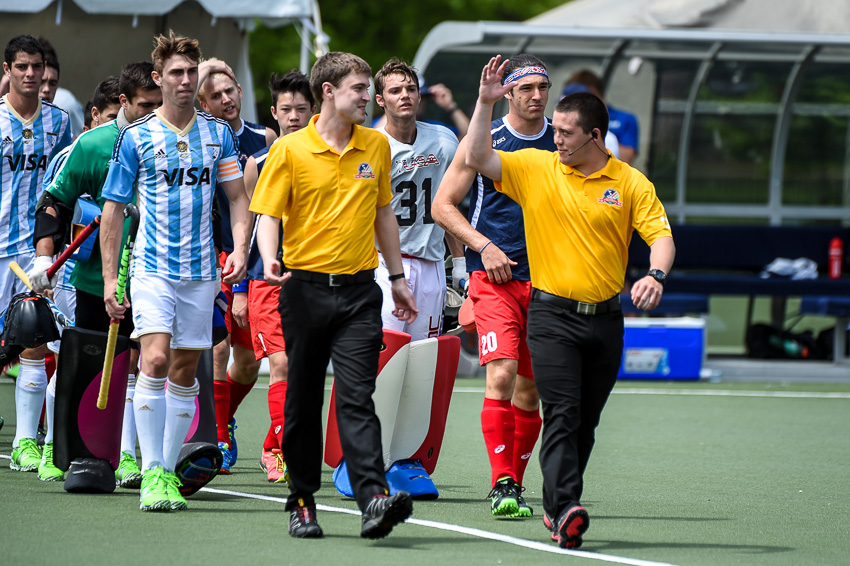
With the 2016 Rio Olympics around the corner the world’s eyes are focused in on high performance athletes fine tuning their skills and preparing for the biggest sporting event. Alongside the thousands of athletes and teams preparing are the many, many officials that help ensure the sport is conducted in a fair and safe environment.
Though the Rio Olympics are not in the sights of Canadian field hockey umpire Tyler Klenk, there is still lots of time for the 23-year-old to check a visit to the most prestigious games off his bucket list. Recently Klenk officiated his first international appointment at the Toronto-hosted Junior Men’s Pan American Championships, May 23-28.
“The experience was fantastic,” exclaimed Klenk. “Being that it was my first international appointment, it was a great opportunity to ‘get my feet wet’ so to speak.”
“It was also fantastic that I was able to do my first international competition on home soil. It was great to see Canadian Field Hockey rally behind the whole tournament.”
Junior World Cup qualification was on the line for the eight teams participating and while the Under-21 athletes were busy getting in the right mindset for their young international careers, Klenk was just beginning his show on the world stage.
Having umpired since the age of 14, Klenk has had several years of experience blowing the whistle but it wasn’t until he relocated to British Columbia that he started to take things more seriously. Moving to Vancouver Island to attend the University of Victoria and play for the school’s varsity team placed him in one of the biggest hockey hotbeds in Canada. Along with playing in the Vancouver men’s premier league, Klenk was also a junior national team identified athlete giving him a slight advantage when he does trade in his stick for a whistle.
“Playing at such a high level previous to umpiring gives me the ability see situations from the perspective of the players,” said Klenk, who banked five international games in Toronto. “It also helps me to anticipate the play before it happens. As the speed of the game is also increasing, this anticipation is very important for me to be in better position.”
Klenk’s first appointment was in round-robin play between Argentina and Trinidad and Tobago and from there he finished the tournament umpiring the bronze medal game between Chile and the USA. Klenk’s performance will see his current National rating improve to his international badge. From there the ladder gets steeper with fewer international officials moving on to later qualify for the Promising Umpires List, FIH Grade 1 Umpire, World Development Panel and the World Panel, the latter of which include most of the officials that go to the Olympics.
For now, Klenk can look back on his first international event as a success and the first step on his pathway to being a stand out umpire for Canada.
“The one thing I will take away from the Toronto event is the speed of the international game,” noted Klenk. “Players are becoming more and more skillful and this requires umpires to be on top of their game as well. I really became aware of the importance of using domestic matches to work on all of the areas I need to improve. That way, when I get another international appointment, I will hopefully be on top of my game.”
Prior to this Klenk has banked several major Canadian tournaments including multiple national championships, BC premier men’s games, BC provincial championships, Canadian Interuniversity Sport Championships, Canada West matches as well as the 2015 Canada Cup and 2015 California Cup. Klenk was also named the 2015 Canada West Umpire of the Year following a strong season in the University scene.
Klenk’s umpire development continues both in Vancouver and Victoria and he credits two local officials for helping guide him to where he is now.
“The two most influential people in my umpiring career so far are Chris Wilson and Denise McGeachy,” highlights Klenk of Victoria-based Wilson, a former FIH umpire and current umpire manager, and McGeachy, a Nationally-ranked umpire. “They have both pushed me to improve myself by taking on more and more challenging games. They have helped me develop my skills while helping to identify the areas that I need to improve. I think most importantly; they have not tried to change the kind of umpire I am. Instead, they help make my skill set shine.”
Inevitably Klenk’s skill set will continue to develop and shine upon his return to the West coast and although Klenk may be forced to watch the Rio Olympics from his TV this August, it seems likely that one day the country will be able to watch him on the Olympic stage in years to come.
